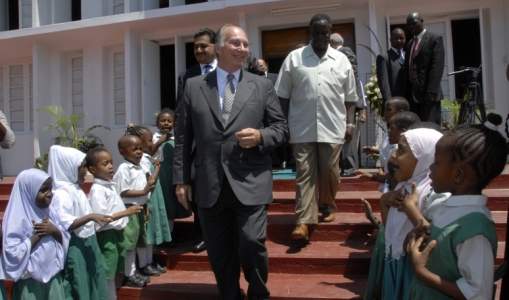Note: Audio is placed below the main text, when available.
25th anniversary of Madrasa Early Chilhood Program - 2009-04-02
2009, April 2nd - Dar es Salaam, Tanzania - Ceremony of the Publication launch of Madrasa Early Chilhood Program on the occasion of the 25th anniversary of that program. [Click here]
Mombasa, Kenya, 14 August 2007 - The Aga Khan Foundation today marked the 25th anniversary of the Madrasa Early Childhood Development Programme in the presence of His Highness the Aga Khan, founder and Chairman of the Aga Khan Development Network (AKDN) and Chief Guest Kenya’s Minister for Science and Technology, Hon. Dr. Noah Wekesa.
The Madrasa Programme was launched a quarter of a century ago at the request of East Africa’s Muslim leaders who wanted to improve the overall educational achievement of their children while at the same time promoting a secular, integrated curriculum based on the universal ethics and values of Islam and local cultural traditions.
The project has led to the establishment of quality, affordable and sustainable community-based early childhood development centres open to children of all faiths, cultures and ethnicities. The programme has been developed in close collaboration with the governments in East Africa, and it provides valuable support in meeting national education goals.
The special event, “A Journey in Early Childhood Development,” was attended by government representatives from the region, leaders of the Ummah, pioneers of the Madrasa Programme, teachers, donors and well wishers. It highlighted the considerable achievements of the Programme in increasing the ability of children from marginalised communities in East Africa to access and succeed in primary and later schooling. This is achieved through fostering pre-school environments in children’s formative years that are stimulating and developmentally and culturally appropriate.
The involvement of parents and communities has been vital to the success and sustainability of the programme, through both their active participation in management and governance of their pre-schools. The Madrasa curriculum adapts universal educational principles through the regional context through the use of distinctly local learning aids made from available materials and by close policy collaboration with the East African Ministries of Education.
Teacher training and continuous mentoring on classroom practice are ensured through the regionally established Madrasa Resource Centres (MRCs). It is through the critical support provided by these MRCs in Mombasa, Kampala and Zanzibar that on-going development and successful implementation of the early childhood curriculum is guaranteed.
“The programme has ensured equal participation of girls and boys in the classroom and provided important employment and leadership opportunities to local women who work as pre-school teachers, trainers and community mobilisers,” says Najma Rashid, Regional Programme Director of the Madrasa Programme in East Africa.
Arif Neky, the Regional Chief Executive Officer of the Aga Khan Foundation in East Africa adds: “The programme has also been an important vector for pluralism in the region, as it has brought together parents, children and community members from different faiths and cultures in a common effort to improve education opportunities.”
The Madrasa Programme has benefited over 54,000 children in Mombasa, Kampala and Zanzibar and has trained over 5,000 teachers and 2,500 school committee members. Research results indicate that students who have attended a madrasa make a better transition into and through primary school than their peers.
During the event, His Highness the Aga Khan launched a new publication, “School Improvement and Early Childhood Development in East Africa: Experiences of the Aga Khan Development Network.” The book consolidates research, lessons and best practices of the Aga Khan Development Network’s education programmes for the benefit of both policymakers and practitioners.
For more information, please contact: Arif Neky
Regional Chief Executive Officer
Aga Khan Foundation (East Africa)
Tel: +254(0)20-223951/2
E-mail: akf.east-africa@akdn.org
E-mail: info@akdn.org
NOTES
Golden Jubilee of His Highness the Aga Khan
His Highness the Aga Khan completed his 50th year as the 49th hereditary Imam of the Shia Ismaili Muslims on 11th July 2007, succeeding his grandfather, Sir Sultan Mahomed Shah. The Aga Khan leads a community of 15 million Ismaili Muslims living in some 25 countries around the world and is a direct descendant of the Prophet Muhammad (peace be upon him and his family). In the Ismaili tradition, the Imam’s Jubilee celebrations offer occasions to launch new social, cultural and economic development projects. In keeping with the ethics of the faith, these projects aspire to improve the quality of life for the most vulnerable in society. During the Jubilee year, the Aga Khan is expected to travel to a number of countries to meet with members of the Ismaili community and visit projects of the AKDN. He is also likely to announce the creation of new development institutions and projects and the significant expansion of existing ones.
The Aga Khan Development Network
His Highness the Aga Khan is founder and Chairman of the Aga Khan Development Network (AKDN), a group of private, non-denominational development agencies working to empower communities and individuals to improve living conditions and opportunities, especially in sub-Saharan Africa, Central and South Asia, and the Middle East. The Network’s nine development agencies focus on social, cultural and economic development for all citizens, regardless of gender, origin or religion. The AKDN’s underlying ethic is compassion for the vulnerable in society. Its annual budget for philanthropic activity is in excess of US$ 300 million.
(akdn.org)
Latest On AKDN
- 12646 reads
 Ismaili.NET - Heritage F.I.E.L.D.
Ismaili.NET - Heritage F.I.E.L.D.